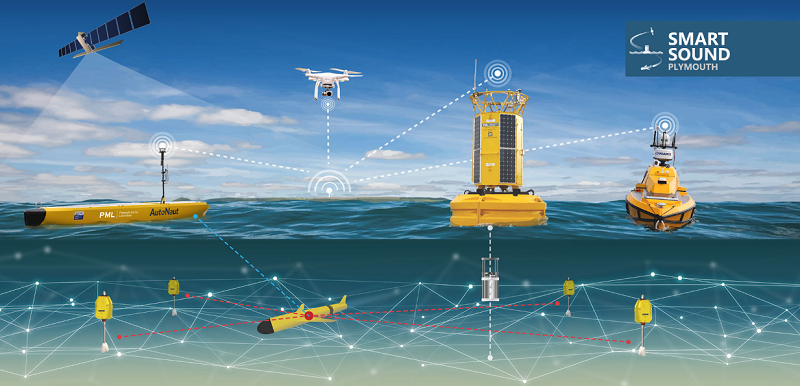Plymouth Sound is to be home to the world’s first 5G ocean-based marine testbed, putting the city at the forefront of marine and maritime innovation.
Part of the Marine Business Technology Centre’s (MBTC) testing and proving ground Smart Sound Plymouth, the testbed will benefit from a 5G mobile private network built by Vodafone using Nokia equipment. The network, known as Smart Sound Connect, will enable ultrafast download speeds and low-latency 5G connectivity to support the development of new marine technology.
Eligible businesses will have free access to the testbed to test 5G use cases including advanced applied autonomy, clean propulsion, smart ports, smart shipping, and environmental monitoring using the Internet of Things (IoT).
The full testbed will be available from early 2021. It will also form the basis of a proposed virtualised testing platform, to allow companies to validate ideas and test adjustments in a virtual environment. With few testbeds offering connectivity beyond the shore’s edge, Smart Sound Connect can support use cases that others cannot.
Councillor Tudor Evans, Leader of Plymouth City Council said: “We’re really making waves here with another world first for Plymouth. It goes without saying we’re incredibly excited to be able to provide this globally significant testbed, which further cements our city’s reputation as the UK’s centre for advanced marine technology development.”
Anne Sheehan, Business Director, Vodafone UK, said: “Smart Sound is a brilliant initiative from Plymouth City Council that will show just how powerful 5G can be for businesses looking to innovate. 5G can accelerate developments in marine technologies, and this is another area where the UK can be a global leader with the right digital tools and skillset.”
Rob Watson, MBTC Director said: “With Smart Sound Connect, the MBTC is able to provide a complete innovation service that allows businesses to utilise one of the most high-tech and comprehensive test and proving environments in the world.
“Not only will our clients be able to benefit from the expertise, research capabilities and advanced equipment of our partners, they will also be able to work closely with Vodafone and Nokia to develop 5G solutions specifically for the marine sector.”
The MBTC is a £4.5 million European Regional Development Fund (ERDF) supported partnership between Plymouth City Council, Plymouth Marine Laboratory, the University of Plymouth, the University of Exeter and the Marine Biological Association that works to facilitate innovation in the marine and maritime sector. The partnership received £1.8 million in funding from the Heart of the South West Local Enterprise Partnership (HotSW LEP) to develop Smart Sound Connect.
Chair of the Heart of the South West LEP Karl Tucker said: “Smart Sound Connect is an excellent project that we’re investing part of our Growth Deal funding in. We know that Digital and Marine are key sectors to the recovery and future prosperity of the Heart of the South West, and this scheme will further enhance our area’s specialisations in both. Added to that, the MBTC is part of Oceansgate, one of HotSW’s portfolio of Enterprise Zones, offering favourable conditions for business growth.”
Dr James Fishwick, Head of Smart Sound Plymouth said: “Smart Sound Plymouth is firmly established as the leading location in the UK for trials and demonstration of cutting-edge marine technologies. The addition of the Smart Sound connect communications network has created a multifaceted solution unrivalled in the UK and placing Plymouth very firmly on the global stage.”
Stephan Litjens, General Manager, Nokia Digital Automation said: “Working in partnership with Vodafone and MBTC on this ‘world-first’ and helping to drive world-leading marine and maritime innovation is an exciting prospect. This ocean-based deployment will highlight all the flexibility and performance advantages that industrial-grade 5G private wireless can bring to organisations that need connectivity in challenging conditions.”
Vodafone will provide 4G and 5G connectivity using four mobile sites at the inlet, and an additional site offshore. The network will utilise Nokia Digital Automation Cloud (DAC), a digitalisation platform capable of providing high-bandwidth, hyper-fast private networking and edge computing capabilities. A compact, plug-and-play system that comprises network equipment and a cloud-based operation monitoring system, Nokia DAC enables users to securely collect, process and host all generated proprietary data on site.
Smart Sound Connect will build on the research already being supported by the MBTC, which has recently included the launch of the UK’s first sea-going electric ferry and the development of an innovative new method of gathering data about the marine environment.

